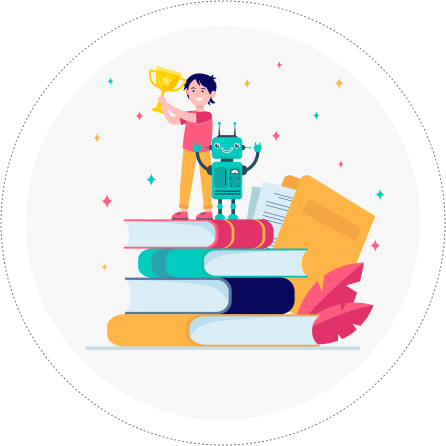Artificial Intelligence 9
- Home
- / Python Handay
- / Artificial Intelligence 9
Welcome!
Artificial Intelligence in Class 9 introduces students to AI concepts, such as machine learning, robotics, and natural language processing. It focuses on understanding AI’s applications in daily life, problem-solving, and ethical considerations in technology. The exam is 100 marks, with 50 marks for theory and 50 marks for practicals. The paper has four sections: 1) Employability Skills, 2) Subject-Specific Skills, 3) Practical Work, and 4) Project Work
Prerequisites
The prerequisites for learning Artificial Intelligence in Class 9 include basic computer skills, logical thinking, and an interest in technology. Students should be familiar with simple coding concepts, math basics, and have curiosity about AI and its real-life applications.
Learning Objectives
The learning objective of Artificial Intelligence is to introduce students to AI concepts, enhance problem-solving and critical thinking skills, and help them understand how AI technologies work in real-life applications, preparing them for future technological advancements.
Course Overview
Part 1 Employability Skills 10 Marks
- Introduction to Communication
- Effective Listening:
- Speaking Skills
- Non-verbal Communication
- Barriers to Effective Communication
- Introduction to Self-management
- Stress Management
- Self-Motivation
- Personal Strengths and Weaknesses:
- Introduction to ICT
- Basic Computer Operations
- Using the Internet
- Cyber Safety
- Introduction to Entrepreneurship
- Entrepreneurial Qualities
- Business Idea Identification
- Introduction to Green Economy
- Conservation of Resources
- Environment-Friendly Practices
Part 2 : SUBJECT SPECIFIC SKILLS 40 Marks
- Introduction to AI
- AI Project Cycle
- Ethics in AI
- Reflection
- Understanding Data
- Data Collection and Cleaning
- Data Representation
- Data Bias and Privacy
- Basics of Statistics
- Probability Fundamentals
- AI Models.
- Generative AI Basics
- Applications of Generative AI
- Ethical Considerations.
Introduction to Python Programming: Overview of Python and its real-world applications.
Understanding IO in Python: Input and output operations.
Writing First Program: Basic Python program execution.
Python Tokens: Keywords, identifiers, literals, and operators.
Comments: Writing single-line and multi-line comments in Python.
Data Types: Introduction to basic data types (int, float, string, etc.).
Operators: Arithmetic, logical, and comparison operators.
Conditional Statements: if, elif, and else statements.
Loops: for and while loops for iteration.
List: Creating, accessing, and manipulating lists.
Part 3 Practical Work 35 Marks
- Practical Examination of Python : 30 Marks
- Viva Voce : 05 Marks
Part 4 Project Work
- Practical File/ Student Portfolio 15 Marks
Enquiry Now
Our Courses
Data Analyst using Python
Select Tech MindGuru for Why ?
Placement Assistance
Placement assistance offered for a successful career.
Membership
Membership provided until the final examination.
Personalized Attention
Personalized attention provided to each student.

Get Course Certificate
Certificate awarded upon completion of the course.
Monthly Tests
Regular monthly test series for progress evaluation.
Latest CBSE Syllabus
Training modules aligned with the latest CBSE syllabus.
Frequently Asked Questions
The syllabus includes AI fundamentals, data literacy, machine learning concepts, project cycle, ethics in AI, and Python programming basics.
Assessment typically consists of theory exams, practical assessments, and project evaluations, contributing to overall marks.
Basic computer skills and an interest in technology are recommended, but no prior knowledge of AI is required.
Practical work involves hands-on coding in Python, data analysis, and applying AI concepts through projects and exercises.
Yes, students are required to complete a project that applies AI concepts, encouraging practical application and understanding.
Students will develop skills in programming, critical thinking, data analysis, ethical reasoning in technology, and teamwork through projects.


